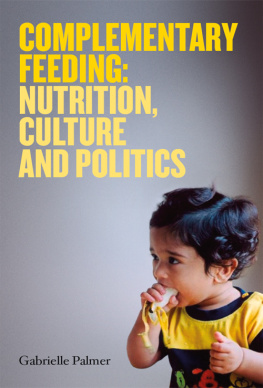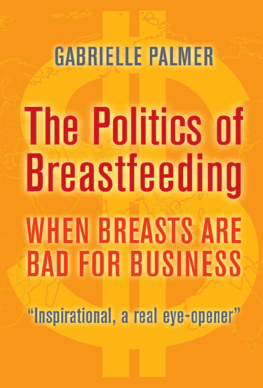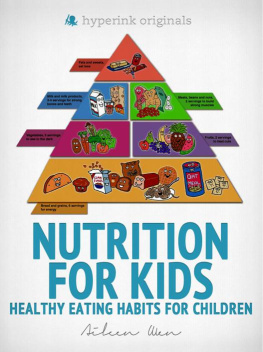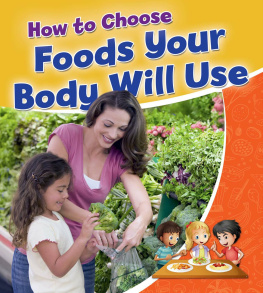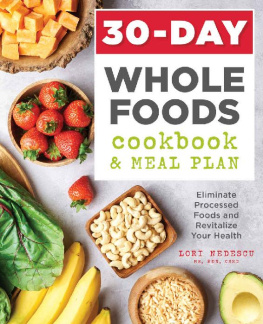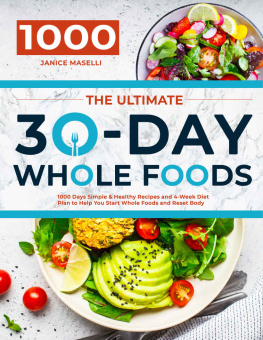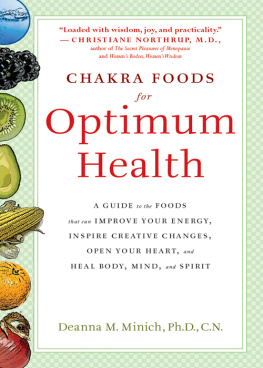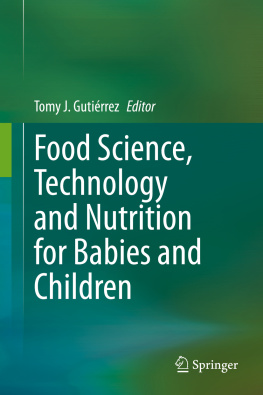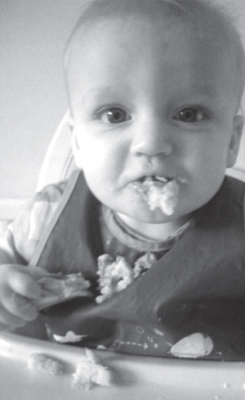COMPLEMENTARY
FEEDING:
NUTRITION,
CULTURE
AND POLITICS
Gabrielle Palmer is a nutritionist and is the author of the book The Politics of Breastfeeding, also published by Pinter & Martin. A breastfeeding counsellor in the 1970s, she later went on to help establish the UK IBFAN group, Baby Milk Action. In the early 1980s she worked in Mozambique. She has written and campaigned on infant feeding issues, particularly the unethical marketing of baby foods. In the 1990s she co-directed the International Breastfeeding: Practice and Policy Course at the Institute of Child Health in London, until she went to live in China for two years.
She has worked independently for various health and development agencies, including serving as HIV and Infant Feeding Officer for UNICEF New York. She recently worked at the London School of Hygiene and Tropical Medicine where she originally studied nutrition. She is a mother and a grandmother.
COMPLEMENTARY FEEDING:
NUTRITION,
CULTURE
AND POLITICS
Gabrielle Palmer
Complementary Feeding: Nutrition, Culture and Politics
Based on Gabrielle Palmers paper What is complementary feeding? A philosophical reflection to help a policy process IBFAN-GIFA, 2009
This edition first published in Great Britain by Pinter & Martin Ltd 2011
Copyright Gabrielle Palmer 2011
All rights reserved
ISBN 978-1-905177-42-4
The right of Gabrielle Palmer to be identified as the author of this work has been asserted by her in accordance with the Copyright, Designs and Patent Act of 1988
British Library Cataloguing-in-Publication Data
A catalogue record for this book is available from the British Library
This book is sold subject to the condition that it shall not, by way of trade and otherwise, be lent, resold, hired out, or otherwise circulated without the publishers prior consent in any form or binding or cover other than that in which it is published and without a similar condition being imposed on the subsequent purchaser
Printed in Great Britain by TJ International Ltd, Padstow, Cornwall
Pinter & Martin Ltd
6 Effra Parade
London SW2 1PS
www.pinterandmartin.com
CONTENTS
INTRODUCTION
If you are looking for a strict set of instructions on how to feed your baby or toddler, put this book down immediately. However, if you are curious about the world, its children and their nutrition, buy this at once. This small book is based on a paper I wrote for the International Baby Food Action Network (IBFAN). For over thirty years this organisation has been working to halt the unethical marketing of baby foods. Its main brief has been the protection of breastfeeding and safer artificial feeding through the global implementation of the WHO/UNICEF International Code of Marketing.
Many people are aware of the controversies surrounding the aggressive promotion of substitutes for breastmilk but when it comes to the food that a child eats when she needs more than milk, the whole world is in a muddle. IBFAN wanted to work out its own policy on complementary feeding so I wrote this to stimulate discussion, ideas and more investigation.
I hope that you, inquiring reader, will not take anything I have written as an absolute truth. Rather, I hope that these words will prompt you to poke into the great pot of information and misinformation that marks our age and work out for yourself what is nonsense and what is sense.
ACKNOWLEDGEMENTS
I warmly thank Adriano Cattaneo, Joanne Csete, Peter Greaves, Yasmin Hosny, Alison Jones, Lida Lhotska, Alison Linnecar, Rebecca Norton, Gill Rapley and Judith Richter, for their comments, information, suggestions and encouragement.
I warmly thank the children, parents, grandparents, photographers and colleagues for their photos. I thank UNICEF for the photos on pages 26 and 53.
FOREWORD
All that area was wooded. There were small farms, full of maize,
millet, sorghum. The rivers were huge and clean.
There was no tea. Today we see tea, tea, tea.
Mother never planted tea. Tea has become slave labour.
Environmentalist and Nobel Prize winner Wangari Maathai, describing changes in the area in Kenya where she grew up (2009)
Almost thirty years ago in Mozambique, I was teaching mothers of malnourished infants and young children how to improve complementary feeding.and I let the moment go.
The important lessons that these women taught me were that, firstly, food availability is more important than knowledge and that the reverse is cruel; secondly, that millions of mothers have been able to feed their children for thousands of years without input from experts.
Having read many official documents on complementary feeding, I long to tear them into shreds and throw them out of the window. Around the world in both rich and poor regions are numerous human beings who are alive and healthy. They are the evidence that mothers (and other family members) have been able to feed their children successfully. In 2009, the press reported the worlds oldest man to be 113-year-old Henry Allingham. He was born in 1896 in a poor area of London and, during his second year, his father died of tuberculosis. Whatever his mother did can only be judged to have been the right thing.
This book does not set out to draw conclusions, make prescriptions or give practical guidance or recommendations; its purpose is to stimulate thought and debate about the subject of complementary feeding. In order to do this I will present a range of topics, facts and comment which I hope will achieve this purpose and help the necessary discussion by moving beyond the confinement of deference to the powerful, the expectations of those who hold the purse strings, political fashion and cultural inhibition.
By complementary feeding I mean the addition of other foods to the diet of an infant or young child who is either breastfed or fed with expressed breastmilk or a breastmilk substitute. I avoid the word weaning because it lacks clarity. Some interpret weaning as the addition of other foods to breastfeeding or feeding with breastmilk substitutes, while others use it to mean stopping breastfeeding. The international health agencies WHO and UNICEF also avoid this word.
There is a risk of hand to mouth pathogenic contamination from touching a dead bird, but thorough cooking (which was the norm in that area) would render it safe for eating. Hand washing after handling the bird would be desirable as infection would be through touch rather than consumption. In parts of Europe, game birds are suspended for two or three weeks to facilitate breakdown of the flesh by intrinsic bacteria. This process is favoured by gourmets for improving the flavour and texture of the meat. Game meat is customarily well cooked.
At 113 years old, Henry Allingham was proclaimed the oldest man in the world by Guinness World Records. He died on the 18th July 2009.
PART ONE
THE BIG PICTURE
ENTITLEMENT TO FOOD
In his seminal book Poverty and Famines, Nobel Prize winning economist Amartya Sen introduced his theory of entitlement. This simple and compelling concept shows that people suffer hunger and die, not from lack of food, but from lack of entitlement to food. For example during the 19th century famines in Ireland, grain was exported to England. The Irish died because they depended on potatoes and the crop failed when blight disease struck. The Irish had no entitlement to the grain crops which they grew as land rent for the English landowners.

